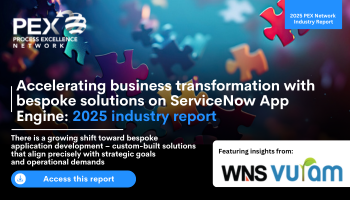Generative AI’s game-changing role in digital transformation
Generative AI’s innovative features are well suited to supporting digital transformation
Add bookmark
Generative AI is undoubtedly the buzz phrase of 2023, but what role does this emerging technology play in relation to the less new but equally important concept of digital transformation?
Digital transformation describes the revolution of traditional, often manual business processes to digitally driven, holistically agile strategies. The innovative capabilities of generative AI models – such as the power to learn input data patterns and structure and generate new data with similar characteristics – are well suited to supporting digital transformation efforts. From enhancing business workflows and efficiency to improving data management and cutting costs, generative AI offers several game-changing digital transformation opportunities.
However, as with any novel technology that promises so much, knowledge of the associated risks and challenges, along with well-planned implementation, are key to success.
Join the PEX Network community

Don't miss any news, updates or insider tips from PEX Network by getting them delivered to your inbox. Sign up to our newsletter and join our community of experts.
Learn MoreRefining the value of data
Data is the lifeblood of digital transformation, and generative AI is refining organizations’ ability to derive value from the data they hold. “A trove of unstructured and buried data is now legible, unlocking business value,” according to a MIT Technology Review report. Generative AI’s new ability to surface and utilize once-hidden data will power extraordinary new advances across the organization, it stated.
“This includes using generative AI to create synthetic data that augments real-world source data, which can help when companies do not have enough material upon which to train machine learning models, or when confidential or sensitive data cannot be shared due to privacy concerns,” wrote Ricardo Madan, senior VP and head of TEKsystems Global Services.
In the generative AI era, CIOs and technical leads are embracing next-generation data infrastructures such as data lakehouses to democratize access to data and analytics, the MIT report added.
Enhancing software development
Generative AI holds significant promise for the productivity of software developers, driving gains and accelerating the innovation cycle and time to market. “Generative AI shines at pattern matching and pattern synthesis, such as translating one language into another,” according to technology tools and consulting services provider Thoughtworks. The most obvious use of that strength for software delivery is for a new kind of code generation, where the AI translates natural language into code, or one type of code into another, it added.
This can also be taken advantage of in translating change logs into a release description, turning code and team chats into more coherent documentation or mapping unstructured information into more structured formats and templates. It could even help teams generate test and sample data.
Revolutionizing customer support and CX
Customer support and customer experience (CX) are other business areas experiencing notable transformation thanks to generative AI, leading to valuable outcomes beyond just productivity gains and cost reduction. “Generative AI models analyze conversations for context, generate coherent and contextually appropriate responses, and handle customer inquiries and scenarios more effectively,” read an IBM blog. They can handle complex customer queries including nuanced intent, sentiment and context, delivering relevant responses.
For example, Generative AI can perform the repetitive tasks needed to gather the information needed to enhance the feedback loop within a call center, IBM said. “It can summarize and analyze complaints, customer journeys and more, allowing agents to dedicate more time to customers. The insights produced make evaluating performance improvements for enhanced services much easier, so call centers can contribute to revenue generation.”
Likewise, generative technologies provide strong foundational capabilities that can be applied across the customer lifecycle to enhance CX. “One key ingredient to delivering an engaging experience is content,” according to Capgemini. Content plays a critical role in creating engaging and memorable experiences across digital touchpoints – Generative AI can help businesses create more personalized and relevant content at scale.
Consumers want to see a broad implementation of generative AI across their interactions with organizations, Capgemini research indicated. “Generative AI tools such as ChatGPT are becoming the new go-to for 70% of consumers when it comes to seeking product or service recommendations, replacing traditional methods such as search.”
Reshaping digital marketing
Generative AI is reshaping digital content marketing processes, a significant element of businesses success across various industries, according to research from Deloitte. More than a quarter (26 percent) of marketers surveyed said they currently use generative AI to improve and adapt marketing, with a further 45 percent planning to by the end of 2024. The common use cases include creating data visualizations/infographics (59 percent), images and visuals (56 percent) and captions (50 percent).
Generative AI users reported saving an average of 11.4 hours per week, enabling them to focus on higher-value or more strategic tasks. Meanwhile, companies topped revenue goals by an average of 14% in the prior year and experienced a 12% return on generative AI investments, the report said.
Generative AI’s governance challenges
Generative AI is here to stay. By 2025, 10 percent of all data will be generated by AI, according to Gartner, while Deloitte expects the market to double every other year for the next 10 years. However, generative AI comes with significant governance challenges that may exceed the capabilities of existing data governance frameworks within organizations, warned the MIT report. “When working with generative models that absorb and regurgitate all the data they are exposed to, without regard for its sensitivity, organizations must attend to security and privacy in a new way,” it read.
Enterprises also now must manage exponentially growing data sources and data that is machine-generated or of questionable provenance, requiring a unified and consistent governance approach. “Lawmakers and regulators have grown conscious of generative AI’s risks, as well, leading to legal cases, usage restrictions and new regulations.”
CIOs would be reckless to adopt generative AI tools without managing their risks, ranging from bias to copyright infringement to privacy and security breaches, the report stated. “Commercial organizations and governments alike have to tread a fine line between embracing AI to accelerate innovation and productivity while creating guardrails to mitigate risk and anticipate the inevitable accidents and mishaps ahead.”
Organizations must fully understand what data generative AI will process, identify desired outcomes and assess the potential impacts and risks for use cases, Cory Cowgill, CTO at Fusion Risk Management, tells PEX Network. “For example, organizations must carefully evaluate and understand privacy rights and regulations if they want to process personally identifiable information (PII) with generative AI. Creating an AI governance program with the associated policies, procedures and controls can ensure organizations can leverage generative AI in their digital transformation initiatives while maintaining customer, partner and employee trust.”
Accelerating business transformation with bespoke solutions on ServiceNow App Engine

Today, off-the-shelf software solutions offer diverse features that enable vast opportunities to implement and maintain business transformation. However, in some circumstances, capabilities lack the flexibility and specificity required to address the unique challenges and workflows of individual organizations. As a result, there is a growing shift toward bespoke application development – custom-built solutions that align precisely with strategic goals and operational demands.
Download this report to explore how enterprises can harness the power of custom applications to drive meaningful transformation. With the growing adoption of low-code platforms like ServiceNow App Engine, organizations are building custom applications faster and with greater control. By empowering both IT professionals and citizen developers to build tailored solutions, organizations can significantly reduce time to value while maintaining control over quality and compliance.
Download Now






















